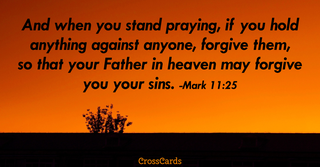- Recent Translations
- All Translations
Mark 11:25
Share
Settings
Mark 11:25 in Other Translations
Mark 11:25 Meaning and Commentary
And when ye stand praying
Are about to engage in that work, or are engaged in it, performing it in such a posture; for standing was an usual posture in praying; (See Gill on Matthew 6:5);
forgive, if ye have ought against any, that your Father also in
heaven may forgive you your trespasses.
The sense is, that if, while a man is praying, it comes into his mind that such an one has committed a trespass against him, has done him an injury, of which he has just reason to complain; but instead of complaining of it before God, and calling upon him to avenge his cause, he should immediately in his heart, and from his heart, forgive him, even though he is not present to acknowledge his sin, and ask his pardon; and such an one may expect forgiveness of God, and a manifestation of it to his soul; which is one the things he is constantly praying for, as his daily case makes it necessary: not that it is to be understood as though his for, giving the person that has offended him, is the cause, or condition, of his receiving remission of sin at the hand of God; for then it would not be through the blood of Christ, and according to the riches of his grace; but this points at a temper and disposition of mind well pleasing to God, and describes persons who may expect this favour from him; (See Gill on Matthew 6:14).
Mark 11:25 In-Context
Cross References 1
-
1.
S
Matthew 6:14
Footnotes 1
- [a] Some manuscripts include here words similar to Matt. 6:15.
